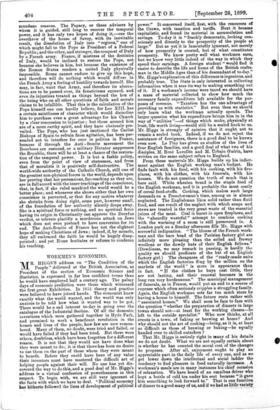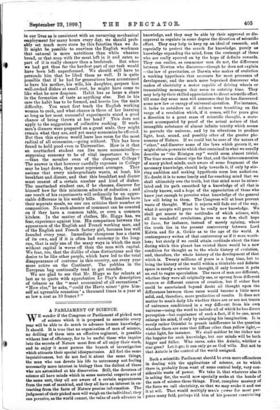WORKMEN'S ECONOMIES.
MR. HIGGS'S address on "The Condition of the People " delivered at the British Association, as President of the section of Economic Science and Statistics, is expressed in far less confident terms than he would have employed half a century ago. The palmy days of economic prediction were those which witnessed the first great Exhibition. In 1851 theory and practice were believed to have joined hands. The economist knew exactly what the world wanted, and the world was only anxious to be told how what it wanted was to be got. There would be a sad interest to-day in going over the catalogue of the Industrial Section. Of all the domestic inventions which were gathered together in Hyde Park, and promised to work a beneficent revolution in the homes and lives of the people, how few are now remem- bered. Many of them, no doubt, were tried and failed, or would have failed if they had been tried. But there were others, doubtless, which have been forgotten for a different reason. It is not that they would not have done what they were meant to do ; it is that there has been no desire to use them on the part of those whom they were meant to benefit. Before they could have been of any value their inventors must have mastered the difficult art of helping people against their will. No one has yet dis- covered the way to do this, and a good deal of Mr. Higgs's address is a virtual confession of powerlessness in this respect. To begin with, we are still very ignorant of the facts with which we have to deal. "Political economy has hitherto followed the lines of development of political power." It concerned itself, first, with the resources of the Crown, with taxation and tariffs. Next it became capitalistic, and found its material in accumulation and savings. To-day it is "frankly democratic, looking con- sciously and directly to the prosperity of the people at large." But as yet it is lamentably ignorant, not merely of how prosperity is created, but of what constitutes prosperity. We know pretty well what workmen earn, but we know very little indeed of the way in which they spend their earnings. A. foreign student " would find it easier to describe the life and home of the British crafts- man in the Middle Ages than of his descendant of to-day."
Mr. Higgs's explanation of this difference is ingenious, and probably true. The State is only interested in collecting information when it sees its way to making something out of it. If a workman's income were taxed we should have a mass of material collected to show how much the necessary family expenditure left available for the pur- poses of revenue. " Taxation has the one advantage of providing us with statistics." But even then we should only learn what the workman actually spends. The larger question what his expenditure brings him in in the way of " utilities "—of things which make, physically at least, life worth living—would still be a sealed book to us. Mr. Higgs is strongly of opinion that it ought not to remain a sealed book. Indeed, if we do not reject the assistance of foreigners, there is a good deal to be known even now. Le Play has given us studies of the lives of four English families, and a good deal of what two of his disciples, M. Rene Lavollee and M. Ilrbain Guerin, have written on the same subject refers to England.
From these materials Mr. Higgs builds up his indict- ment against the English working man's budget. He finds fault with his food, with his cooking, with his fire- places, with his clothes, with his funerals, with his houses. We do not question the truth of much that is here said. White wheaten bread is the staple food of the English workman, and it is probably the most costly of cereal food-stuffs. Cooking. which makes such large demands on a Frenchwoman's time, among us is almost neglected. The Englishman likes solid rather than fluid food, and one result of the neglect with which soups and stews are treated is the very great waste of the essential juices of the meat. Coal is burnt in open fireplaces, and the "absurdly wasteful" attempt to combine cooking with the warming of a room is still "persevered in. A London park on a Sunday afternoon fills Mr. Higgs with sorrowful indignation. " The blouse of the French work- man and the bare head of the Parisian factory girl are infinitely more pleasing than the soiled and frowsy woollens or the dowdy hats of their English fellows." (Dowdiness, we may remark in passing, is hardly the quality we should predicate of the hat of an English factory girl.) The cheapness of the "ready-made suits which the English factories fling by the million on the markets of the world" is more in appearance than in fact. " If the clothes he buys cost little, they are not lasting, and their renewal becomes in the long run very burdensome." The municipal management of funerals, as in France, would put an end to a source of expense which often seriously cripples a struggling family. Again, the English workman sets far too much store by having a house to himself. The future rests rather with " associated homes." We shall soon be face to face with the question " whether the preparation of dinners in large towns should not—at least for the working classes—be left to the outside specialist." Who now thinks, at all events in a town, of baking or brewing at home? And why should not the art of cooking—being, as it is, at least as difficult as those of brewing or baking—be equally handed over to skilled outsiders ?
That Mr. Higgs is entirely right in many of his details we do not doubt. What we are not. equally certain about is whether he has counted the moral cost of the changes he proposes. After all, enjoyment ought to play an appreciable part in the daily life of every one, and as we get lower down the intellectual and social ladder the tendency to find pleasure in food naturally increases. A workman's meals are in many instances his chief occasion of relaxation. We have heard of an omnibus driver who kept a bottle of cold tea under his seat because " it gave him something to look forward to." That is one function of dinner to a good many of us, and if we had as little variety in our lives as is consistent with an unvarying mechanical employment for many hours every day, we should prob- ably set much more store by this function than we do. It might be possible to convince the English workman that oatmeal is more nutritious than white wheaten bread, or that soup with the meat left in it and eaten as part of it is really cheaper than a beefsteak. But when we had got thus far the hardest part of our task would have been left unperformed. We should still have to persuade him that he liked them as well. It is quite possible that if he had for generations been accustomed to have his mother, his wife, his daughter, prepare him well-cooked dishes at small cost, he might have come to like what he now despises. Habit has as large a share in the formation of taste as anything else. But in his case the habit has to be formed, and herein lies the main difficulty. You must first teach the English working woman to cook, and what chance is there of her learning so long as her most successful experiments stand a good chance of being thrown at her head ? This does not apply to the suggestion of collective cooking. If work- men's dinners were prepared on a great scale, they might remain what they are, and yet many economies be effected. But then this system would leave less room for the most radical of all economies.—going without. This has been found to hold good even in Universities. How is it that an unattached student can live more economically— supposing economy to be of vital importance to him —than the member even of the cheapest College ? The answer is that however carefully expenses in College may be kept down, they must represent averages. They assume that every undergraduate wants, at least, his breakfast and dinner, and that this breakfast and dinner must consist of a certain number and kind of dishes. The unattached student can, if he chooses, discover for himself how far this minimum admits of reduction ; and one result of his experiments will ordinarily be an appre- ciable difference in his weekly bills. When families have their separate meals, no one can criticise their number or composition. No such absence of comment can be counted on if they have a common table, or even a common kitchen. In the matter of clothes, Mr. Higgs has, we fear, experience against him. His comparison between the appearance of the English and French working man, and of the English and French factory girl, becomes less well founded every year. Immediate cheapness has a charm of its own, and if it is often bad economy in the long- run, that is only'one of the many ways in which the man without capital is worse off than the man with capital. We fear, too, that the dislike of class distinctions and the desire to be like other people, which have led to the total disappearance of costume in this country, are every year more active on the Continent. The pebbles 'in the European bag continually tend to get rounder. We are glad to see that Mr. Higgs so far relents at last as to quote with approbation Le Play's description of tobacco as the " most economical of all recreations." "How else," he asks, "could the Hartz miner give him- self ail agreeable sensation' a thousand times in a year at so low a cost as 10 francs ? "



































 Previous page
Previous page